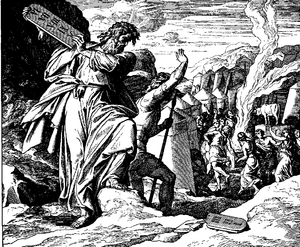Finger of God
The "finger of God" is a phrase used in the Bible. In Exodus 8:16–20 it is used during the plagues of Egypt by the Egyptian magicians.[1] In Exodus 31:18 and Deuteronomy 9:10 it refers to the method by which the Ten Commandments were written on tablets of stone that were brought down from biblical Mount Sinai by Moses.[2]

It was also used once by Jesus in the Gospel of Luke to describe how he had cast out demons.[3]
Hebrew Bible
The first time the phrase "finger of God" appears is in the Hebrew Bible, in the eighth chapter, in the paragraph of verses sixteen through twenty of the Book of Exodus, which reads
Then the Lord said to Moses, "Say to Aaron, 'Stretch out your staff and strike the dust of the earth, so that it may become gnats throughout the whole land of Egypt.'" And they did so; Aaron stretched out his hand with his staff and struck the dust of the earth, and gnats came on humans and animals alike; all the dust of the earth turned into gnats throughout the whole land of Egypt. The magicians tried to produce gnats by their secret arts, but they could not. There were gnats on both humans and animals. And the magicians said to Pharaoh, "This is the finger of God!" But Pharaoh’s heart was hardened, and he would not listen to them, just as the Lord had said.
The second time the phrase "finger of God" appears is at the last verse, verse eighteen of the thirty-first chapter of the same book, which reads "And he gave unto Moses, when he had made an end of communing with him upon mount Sinai, two tables of testimony, tables of stone, written with the finger of God."
The third time the phrase appears is a second reference to the tablets of the Ten Commandments, and is found in Deuteronomy 9:10, which says "And the LORD delivered unto me two tables of stone written with the finger of God; and on them was written according to all the words, which the LORD spake with you in the mount out of the midst of the fire in the day of the assembly."
Writing on the wall
The fourth biblical mention is during Belshazzar's Feast in Daniel 5, when scripture reports 'fingers of a man's hand' wrote on the wall:
- מנא מנא תקל ופרסין
Daniel reads the words "MENE, MENE, TEKEL, UPHARSIN" and interprets them for the king: "MENE, God has numbered the days of your kingdom and brought it to an end; TEKEL, you have been weighed ... and found wanting;" and "PERES, your kingdom is divided and given to the Medes and Persians. Then Belshazzar gave the command, and Daniel was clothed in purple, a chain of gold was put around his neck, and a proclamation was made… that he should rank third in the kingdom; [and] that very night Belshazzar the Chaldean (Babylonian) king was killed, and Darius the Mede received the kingdom." [4]
The phrase handwriting on the wall has entered our lexicon from this reference to mean a warning of impending doom.[5]
New Testament
The phrase is also used by Jesus in the Christian New Testament during his proof that he did not cast out demons by the power of Beelzebub. He said, "But if it is by the finger of God that I cast out the demons, then the kingdom of God has come to you."[6]
In the New Testament story of Jesus and the woman taken in adultery, Jesus writes in the dust of the earth with his finger.[7] Pope Benedict XVI notes from St Augustine that this gesture can be seen as portraying Christ as the divine legislator; Jesus' actions in writing in the dust are redolent of the Finger of God writing the Law on tablets of stone.[8]
References
- Exodus 8:16–20
- Exodus 31:18, Deuteronomy 9:10
- Luke 11:20
- Seow, C.L. (2003). Daniel. Westminster John Knox Press. pp. 74–75. ISBN 9780664256753.CS1 maint: ref=harv (link)
- "idoms". The Free Dictionary.
- Luke 11:20
- John 8:6
- "Angelus". 21 March 2010. Retrieved 22 October 2018.